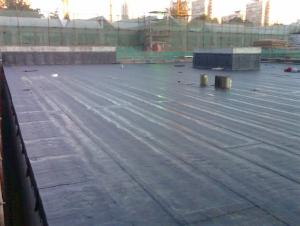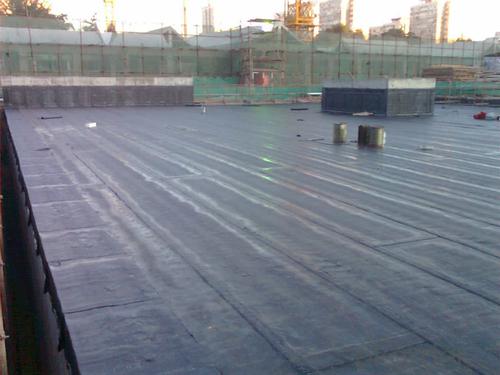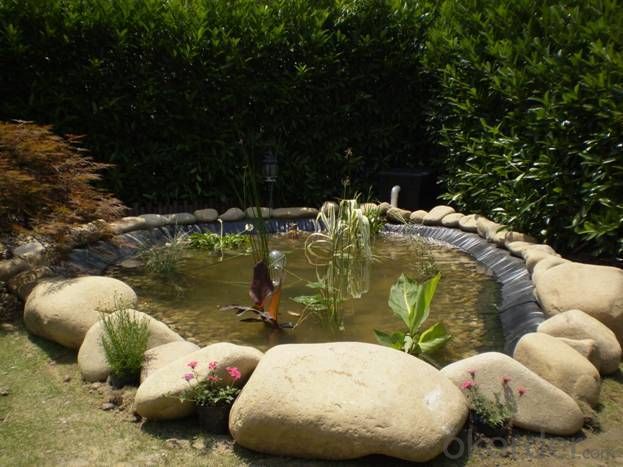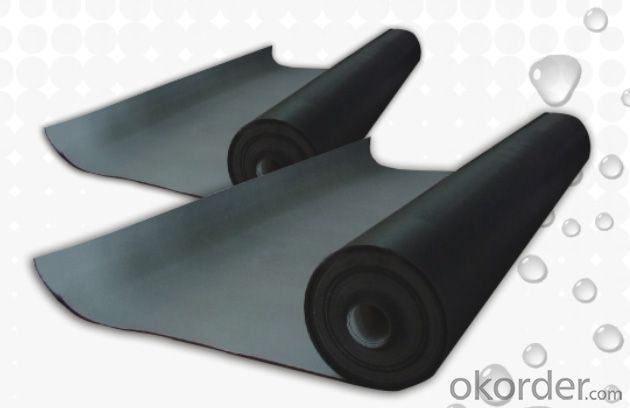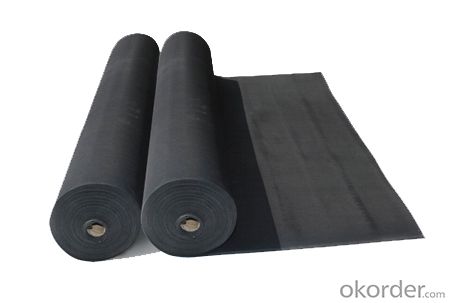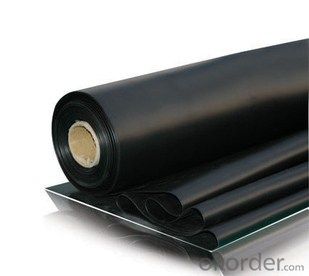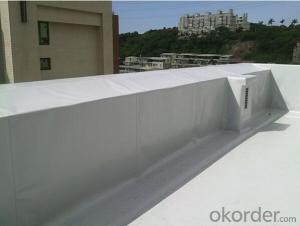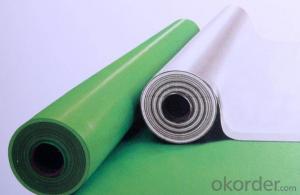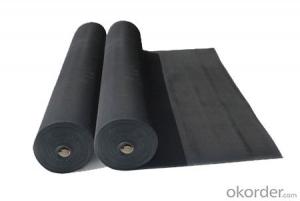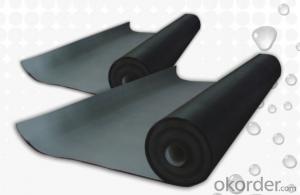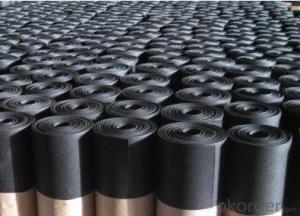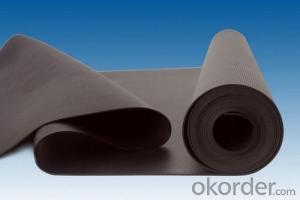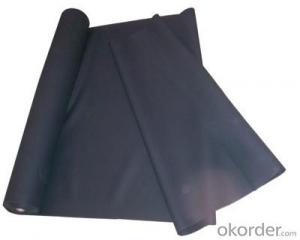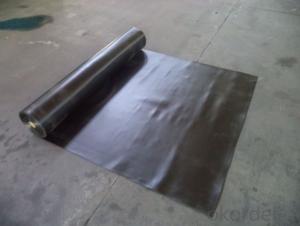EPDM Coiled Waterproof Membrane with 1mm Thickness
- Loading Port:
- Shanghai
- Payment Terms:
- TT OR LC
- Min Order Qty:
- 50000 m²
- Supply Capability:
- 5000000 m²/month
OKorder Service Pledge
OKorder Financial Service
You Might Also Like
EPDM Coiled Waterproof Membrane with 1mm Thickness
Description Of EPDM Coiled Waterproof Membrane with 1mm Thickness:
1. Excellent physical and mechanical performance, high tearing resistance;good deformation adaptability, high puncture resistance;
2. High aging resistance, high UV resistance, anti-acid & alkali;
3. Excellent low & high temperature resistance, innocuous, long life span;
4. Perfect water proof performance, seepage and humidity resistance.
Main Features of EPDM Coiled Waterproof Membrane with 1mm Thickness:
A.Polyester based SBS Modified Bitumen Waterproofing Membrane
a. Strong impermeability
b. High tensile strength, elongation, ability to adapt the grassroots shrinkage deformation and cracking
c. Puncture-resistant, broken resistant, tear-resistant
d. The corrosion resistance, resistance to mildew, weathering good
e. Construction convenient, hot-melt can be operated Four Seasons Construction, reliable joints
B. Fiberglass based SBS Modified Bitumen Waterproofing Membrane
a. High tensile strength, stability of a good size
b. High Temperature good performance
c. Damage resistance, corrosion resistance, resistance to mildew, weathering good performance
d. Good construction performance, reliable joints.
Specifications of EPDM Coiled Waterproof Membrane with 1mm Thickness:
| Material | EPDM Rubber |
| Size | 1.2m (width)*20m (length) or customized, weldable type 2.05m or 4m width |
| Thick | 1.2mm, 1.5mm, 2.0mm |
| Type | Vulcanized & Weldable |
| Pattern | Non-reinforced (homogeneous) |
| Certificate | ISO9001/14001 |
Applications of EPDM Coiled Waterproof Membrane with 1mm Thickness:
geomembrane used in groundsill of road, highway, railway and waterproof layer of swelling clay and wet collapsed loess.Geomembrane can be widely used in areas of garbage burying, waste disposal and underground construction projects.such as below:
- aquaculture ponds
- Ouchi root barrier membrane
- Floating baffles;
- Process wastewater
- Stormwater impoundments;
- Secondary containment;
- Spill containment
- Manure and biogas tanks and covers
- Potable water tanks and covers;
- Sludge Drying beds;
- Bioremediation covers & liners;
- Leachate ponds
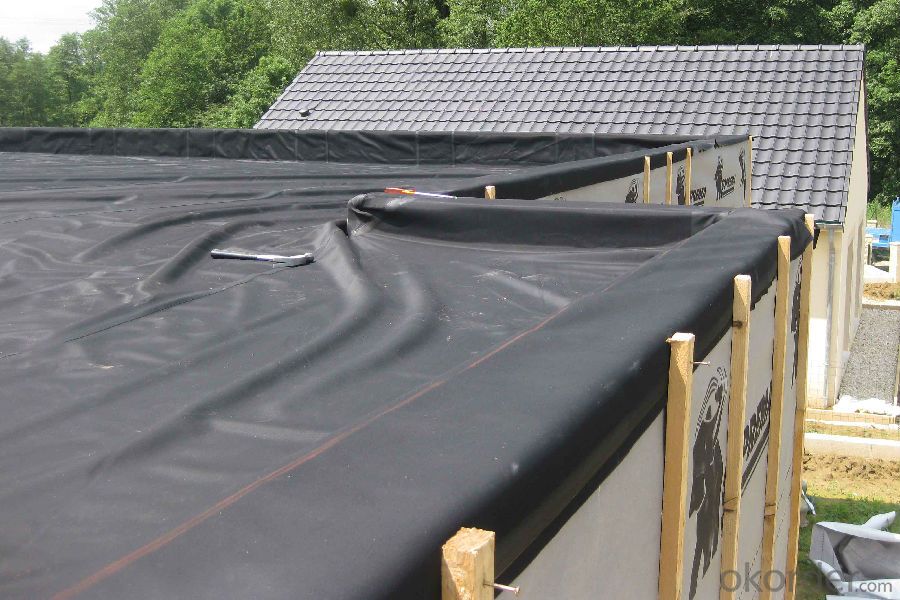
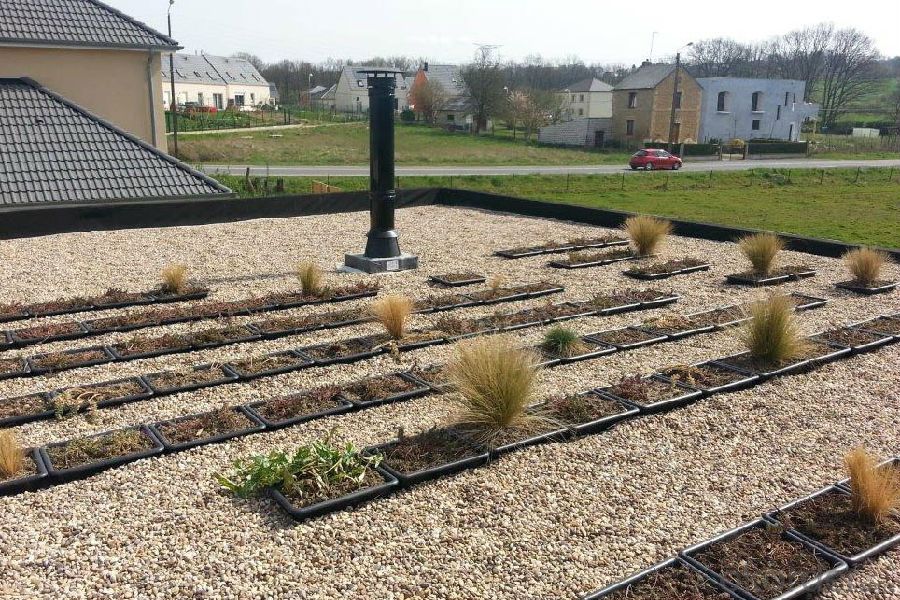
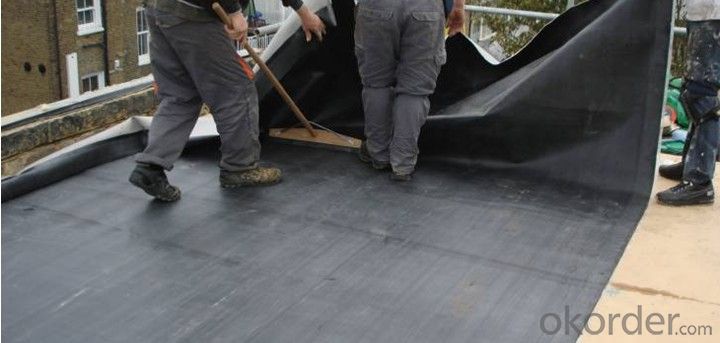
IMages of EPDM Coiled Waterproof Membrane with 1mm Thickness:
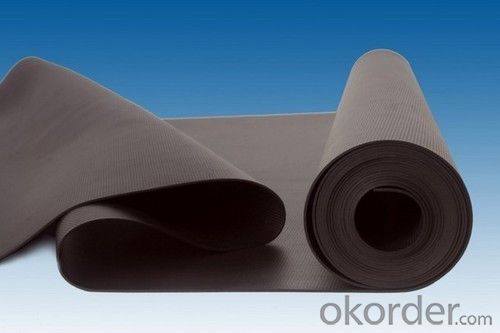
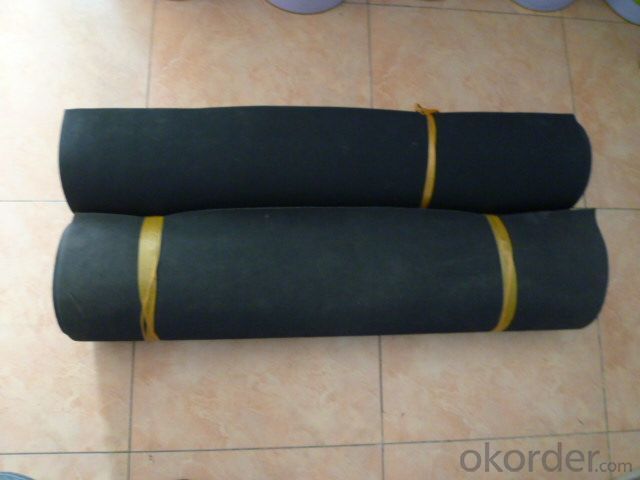
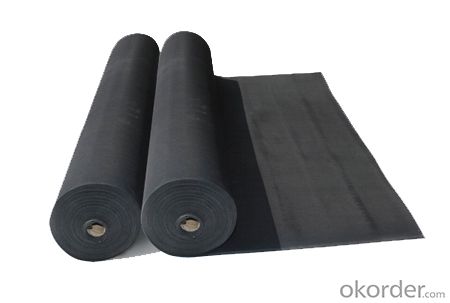
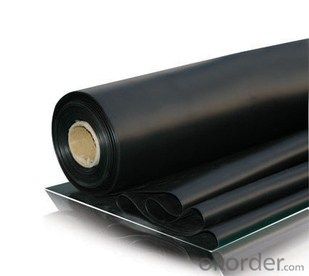
FAQ of EPDM Coiled Waterproof Membrane with 1mm Thickness:
1. What are we supplying?
We are specialized in producing Colorful Asphalt Roof Shingle, SBS/APP modified bitumen waterproof membrane, Self adhesive bitumen waterproof membrane, PVC waterproofing membrane, EPDM rubber roofing membrane, Single Component Polyurethane Waterproof Coating, and Spray Polyurea Waterproof Coating
.
2. How Many years experience do we have?
We have been exported to more than 20 countries in the past 15 years.
3. How long do we usually reply your request?
We always reply our customer within 24 hours.
- Q: Can a waterproofing membrane be used for exterior foundation walls?
- Exterior foundation walls can indeed benefit from the application of a waterproofing membrane. These membranes serve as a defense against water infiltration and are widely utilized in construction to safeguard below-grade structures, like foundation walls, from moisture intrusion. Crafted from robust materials such as rubber, asphalt, or polymer-based compounds that resist water penetration, these membranes form an impermeable shield. Placing a waterproofing membrane on the outside of foundation walls effectively establishes a barrier that thwarts water from seeping into the foundation. This preventive measure aids in averting problems such as water damage, mold growth, and structural decay. Moreover, the utilization of waterproofing membranes also diminishes the risk of cracks and leaks in the foundation, thereby improving the overall resilience and longevity of the structure.
- Q: Is a waterproofing membrane suitable for use in areas with high groundwater levels?
- Yes, a waterproofing membrane is suitable for use in areas with high groundwater levels. The membrane acts as a barrier, preventing water from seeping into structures and causing damage. It provides an effective solution for protecting foundations, basements, and other below-grade areas from water infiltration.
- Q: BS waterproofing membrane is modified? There are not a few thick drawings, how to do
- SBS waterproofing membrane is elastomer modified asphalt waterproofing membrane. Performance indicators Implementation of GB 18242-2008.
- Q: Can a waterproofing membrane be used for stadiums and sports arenas?
- A waterproofing membrane is suitable for stadiums and sports arenas, as they are subjected to different weather conditions and are susceptible to water damage. These large structures can be effectively protected against water infiltration by applying waterproofing membranes to various areas such as the roof, walls, and foundation. This not only maintains the building's integrity and extends its lifespan but also prevents expensive repairs caused by water damage. Moreover, these membranes offer insulation and energy-saving advantages, thereby improving the overall performance of the stadium or sports arena.
- Q: Does a waterproofing membrane require any special considerations for installation in high-humidity areas?
- Yes, a waterproofing membrane does require special considerations for installation in high-humidity areas. High humidity can increase the moisture levels that the membrane is exposed to, potentially affecting its performance and durability. It is important to choose a membrane specifically designed for high-humidity environments and follow proper installation techniques to ensure effective moisture protection. Additionally, regular inspections and maintenance should be conducted to prevent any potential damage or deterioration caused by the high humidity.
- Q: Can a waterproofing membrane be used on rubber surfaces?
- Yes, a waterproofing membrane can be used on rubber surfaces. Waterproofing membranes are designed to create a barrier that prevents water from penetrating and damaging the underlying surface. Rubber surfaces, such as roofs, decks, or even rubber flooring, can benefit from the application of a waterproofing membrane to protect them from water damage. The membrane is typically applied as a liquid or a sheet, and it adheres to the rubber surface, forming a protective layer that prevents water from seeping through. This can help to extend the lifespan of the rubber surface and prevent issues such as leaks or decay caused by moisture. However, it is important to ensure that the waterproofing membrane is compatible with rubber and the specific type of rubber surface being treated, as some membranes may not adhere properly or may cause damage to certain types of rubber. It is always recommended to consult with a professional or the manufacturer of the waterproofing membrane to ensure proper application and compatibility.
- Q: Are waterproofing membranes suitable for stadium structures?
- Yes, waterproofing membranes are suitable for stadium structures. These membranes provide an effective barrier against water infiltration, protecting the structure from potential damage caused by moisture. Additionally, waterproofing membranes are flexible and can accommodate movement in the stadium's structure without compromising their effectiveness.
- Q: Can a waterproofing membrane be applied to wood surfaces?
- Yes, a waterproofing membrane can be applied to wood surfaces.
- Q: Can a waterproofing membrane be used on terrazzo surfaces?
- Yes, a waterproofing membrane can be used on terrazzo surfaces. Terrazzo is a durable and versatile flooring material made from a combination of marble, granite, quartz, or glass chips embedded in a cementitious or epoxy matrix. While terrazzo is generally resistant to water, it is not completely waterproof and can absorb moisture if left untreated. Applying a waterproofing membrane on terrazzo surfaces can help protect it from water damage, staining, and discoloration. The membrane acts as a barrier, preventing water and other liquids from seeping into the terrazzo, thus enhancing its longevity and maintaining its aesthetic appearance. It is important to ensure that the waterproofing membrane is compatible with the terrazzo material and is applied according to the manufacturer's instructions for optimal effectiveness.
- Q: What is the best waterproofing membrane for my project?
- The choice of the best waterproofing membrane for your project will depend on various factors, such as the project type, specific requirements, and budget. There are multiple options available in the market, each offering unique features and advantages. One favored option is the bituminous waterproofing membrane, which is cost-effective and suitable for a wide range of projects like roofs, basements, and foundations. These membranes are durable, flexible, and can withstand extreme weather conditions. They can be applied using methods like torch-on, self-adhesive, or hot-melt. Another alternative to consider is the polyurethane liquid membrane, which provides exceptional elasticity and is ideal for areas requiring flexibility, such as balconies, terraces, and swimming pools. These membranes are resistant to UV rays and can be easily applied using a brush or roller. For projects that demand high durability and resistance, the cementitious waterproofing membrane might be the optimal choice. This type of membrane is a mixture of cement, sand, and special additives that create a thick and protective layer. It is commonly used for underground structures, tunnels, and water tanks. If your project involves below-grade applications or areas with high water pressure, the bentonite waterproofing membrane could be the most suitable option. Bentonite membranes, made of clay minerals, swell when exposed to water, forming a watertight barrier. They are commonly used in basements, foundations, and retaining walls. Ultimately, determining the best waterproofing membrane for your project will depend on your specific requirements, budget, and preferences. It is advisable to consult with a professional waterproofing contractor who can assess your project's needs and recommend the most suitable membrane system.
Send your message to us
EPDM Coiled Waterproof Membrane with 1mm Thickness
- Loading Port:
- Shanghai
- Payment Terms:
- TT OR LC
- Min Order Qty:
- 50000 m²
- Supply Capability:
- 5000000 m²/month
OKorder Service Pledge
OKorder Financial Service
Similar products
Hot products
Hot Searches
Related keywords
